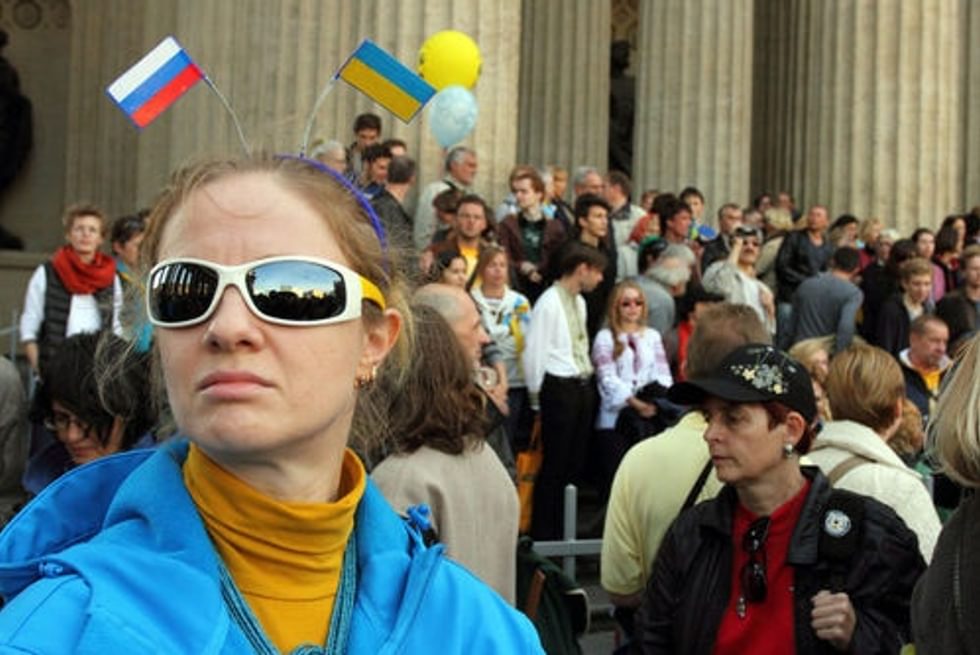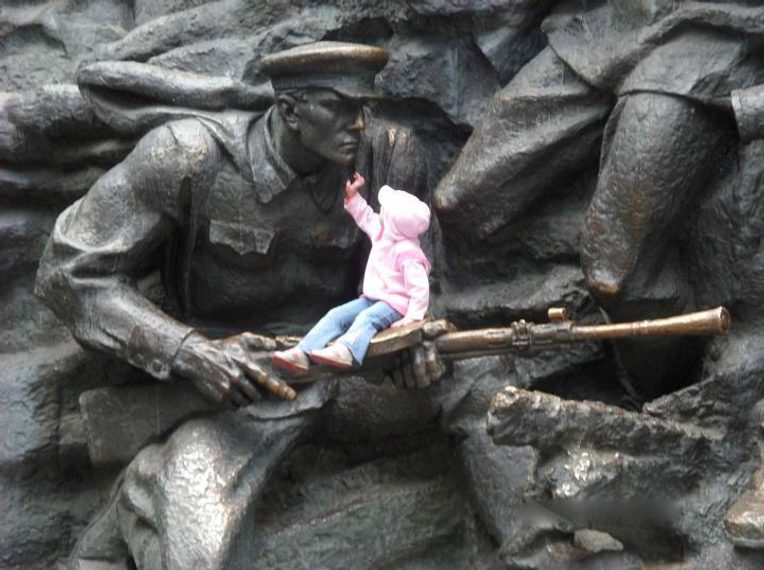Ukraine, the Exception, and the Political: Ethnographic Investigations and Theorization
From the Series: Ukraine and Russia: The Agency of War
From the Series: Ukraine and Russia: The Agency of War


“The exception explains the general and itself. And if one wants to study the general correctly, one only needs to look around for a true exception. It reveals everything more clearly than does the general. Endless talk about the general becomes boring; there are exceptions. If they cannot be explained, the general also cannot be explained.” —Soren Kierkegaard (in Carl Schmitt, Political Theology)
Veiling a timid reaction behind the frail wording of a diplomatic document,1 international society has stood by patiently as Ukraine struggles to (re)assert both its internal and external sovereignty. In the realm of classical international relations, internal sovereignty is the affair of the state, whereas external sovereignty is maintained through diplomacy and war. However, in Ukraine, the events surrounding and following the ousting of the president created an exception that does not fit our theoretical preconceptions of the autonomy of the state, a post-foundational moment when politics mirrors its ontological alter ego, the political.2
Highlighting the crisis with the concept of state of exception, we see that the movement we came to know as "EuroMaidan" suspended the law of the land by ultimately deposing the government in power. This was followed by the suspension of the Ukrainian law in questions relating to Crimea supposedly in order to protect its (Russian) citizens. Finally, the crisis in the Donbas did not result in a suspension of the Ukrainian law and remains a murky argument over the legitimacy of the Ukrainian state in the region. Indeed, exceptions occurred de facto,3 and none were on the sovereign’s terms. In the case of EuroMaidan, the government in power did not declare an exception to deal with the crisis; in Crimea, paradoxically, the exception was acted out by a foreign government in order (that government asserted) to protect its citizens on foreign soil; in the Donbas, it is the leaders of the self-proclaimed Donetsk and Lugansk People's Republic who created a de facto state of exception.
Some political positioning, academic analysis, and media have framed the conflict as an identity crisis: the pro-western against the pro-Russian; separatists against the Ukrainian state; the divergent interests of ethnic Russians, ethnic Ukrainians, and Tatars in Crimea; Russian interests versus those of the European Union, the United States, China; and so on. However, through the haze of symbolism and narratives pushing issues of “identity” to the forefront, a thorough analysis of the Ukrainian conflict exposes a much deeper phenomenon. The erosion of political legitimacy through decades of neglect has fundamentally reshaped the political system, and the current polarization of "identities" is a symptom of that, much more complex, phenomenon.
To reach into this complexity, we must reverse the lens and address Kierkegaard’s general, however boring, and observe the contrast with the exception. On the other side of the country, in a corner of the southwestern oblast of Zakarpattia, I found things apparently quiet during fieldwork in 2014. Life, harsh and difficult, rolls on day-by-day, and borderland villagers hope that the sad events that have unfolded since fall 2013 will not spill over into their region. Some volunteers went to EuroMaidan, but they did so for the money rather than out of the political conviction of righting a wrong. And when word of conscription spread, everyone worried, and many left or looked for ways to escape it. For these villagers, after years of abandonment and abuse, the emperor has no clothes, and hasn't had any for quite a while. Here, Kyiv’s legitimacy never held very strongly, and the institution of a new government only means more of the same.
The last two decades profoundly shaped the relationship between the Ukrainian state and these borderland citizens. The bureaucrats of the former, taken by self-interest, emptied the state’s own capacity to assume its most basic responsibilities of protection and security. The latter, in response, radically reconfigured their ways to live and survive. Territorially anchored, hierarchical multi-generational households are disappearing. Instead, we observe an increasingly mobile, cross-border networked community for which security is not created through a bilateral social contract with the state. The legitimacy of the state as a reflection of the social contract is crumbling and is being replaced by a new political relationship.4
Observing through the prism of the exception and the general, the conflict in Ukraine becomes nuanced, showing more than the spontaneous emergence of violence. The political ethnographer observes a deep reorganization of the society-community relationship that undergirds the framing of the political, altering the basis for the legitimacy of the Ukrainian state. This silent conflict has been going on for years, radically reconfiguring the relationship the citizenry establishes with the sovereign in terms of security and survival. Anarchy entered the everyday, breaking the relative harmony established between communal organization around households and the societal structure of the rule of law. Silently, through Kierkegaard’s general, an exception was created: the political is reformulated, leaving the framework of the state delegitimized.5
Adopting Schmitt’s assertion that "the concept of the political presupposes the concept of the state"6 is dangerous. The sedimentation of discourses and practices veils ongoing changes that influence the traditional idea of congruence between a state and its society. In other words, our vocabulary, our concepts, and the processes and institutions explaining the social contract are not true representations of the political seen through its enactment in the everyday. Since the Cold War, people, citizens, have re-formulated their everyday, sometimes dramatically. Understanding these changes is the key to theorizing today’s political.
1. I refer to the Budapest Memorandum on Security Assurances. The word assurances is seen as less engaging than guarantees. For more on nuances in wording, see Vladimir Socor, “Russia Trashes US–Russian–British Memorandum on Ukraine,” The Jamestown Foundation, March 10, 2014.
2. For more, see Oliver Marchart, Post-Foundational Political Thought Political Difference in Nancy, Lefort, Badiou and Laclau (Edinburgh: Edinburgh University Press, 2007).
3. For a discussion about the suspension of law de jure, see Giorgio Agamben, State of Exception (Chicago: University of Chicago Press, 2005).
4. André Simonyi, “Waiting for the Cows to Come Home: A Political Ethnography of Security in a Complex World. Explorations in the Magyar Borderlands of Contemporary Ukraine” (doctorial dissertation, University of Ottawa, 2013).
5. André Simonyi, “Waiting for the Cows to Come Home.”
6. Carl Schmitt, The Concept of the Political: Expanded Edition (Chicago: University of Chicago Press, 2007), 19.